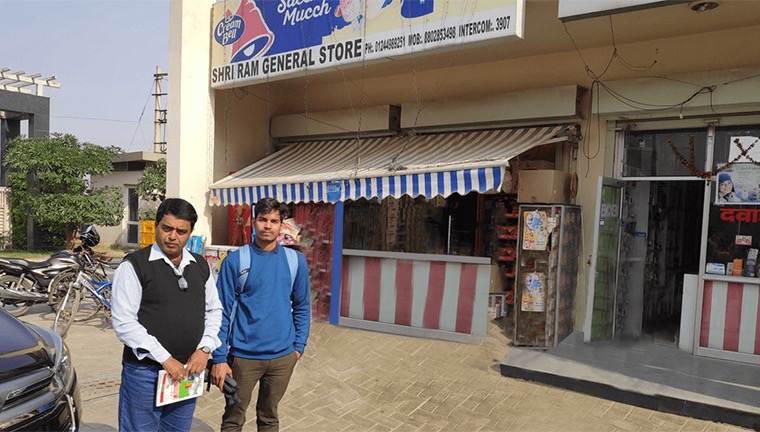Table of Contents
Toggle“Of course you need all these masalas! The wife needs only the chole masala for chole, that one (pointing to a masala) is for dal, each have their own use. She’s not compromising on her masalas”, says Manish, who’s been with Everest Spices for the last 17 years, as we ask him, do people really buy all these different kinds of masalas.
He’d spent the last 15 minutes sorting out the masalas on the shelf to determine which ones he could order, because the shop owner was not present to tell him. Apparently, if the shop owner isn’t present and the order quantity is unknown, the salesman has to himself organize and analyze existing stock. He then places an order as per his assessment which is then verified by the shop owner over the phone.
Statistics show 31% of sales people have been at the job for 10+ years. With all the daily hustle bustle that goes on around us, with products being so easily available, the FMCG market often fails to highlight one of its stars: sales people.
As we spent a day shadowing Manish and Rishabh from Everest Spices to understand what a day in the life of an FMCG sales man looked like, we got some insight into what a regular day for them looked like.
Read How Everest is Spicing Up Secondary Sales Schemes with SFA
The first shop we went to was a Kendriya Bhandar ( a mini grocery story usually found around apartment complexes, contains everything from juices to pulses). Mr Manish seemed to have a great relationship with the shop owner as they greeted each other after which he went along to the spices section and took note of what needs to be restocked. The SFA App he was using at hand, allowed him to select everything that was needed from a pre-made list. He then verified this list with the shop owner and eventually whatsapped it to the distributor. One important aspect of these transactions is schemes. Manish mentioned that the scheme calculations before SFA app was a big task , the auto calculation of the scheme helped in correct and on spot scheme values which helped in better relationships as well as smarter ordering.
“Yay! You have made your first order for the day.. Congratulations!”.. Came up a message on the app once he’d finished the order.
Every salesman is alloted what is known as a beat, which is an area wherein they’re supposed to cover shops. Mr Manish had been covering the beat we were on for almost 5-7 years. He mentioned how he can route the outlets on a google map via SFA App and is a lot more satisfied since his beat is still covered by colleague when he is on leave using Google Routes.
Next, we walked through a gali (street), with small shops and huts on both sides, to reach our next shop. As we reached the store, Rishabh went and spoke to the owner, but came back rather disillusioned some 5 – 10 minutes later. We asked him what the matter was. He said there was a payment issue which is why no order was taken as he marked the payment issue option in his SFA App.
We asked Mr Manish how he’d seen the world of FMCG progress since he’d been in the field for such a long time. He goes, “Aaj kal toh chai paani peeyo, bohot kuch behtar ho gaya hai, pehle toh struggle karni padti thi” meaning “These days you drink tea and get through the day, things have gotten a lot better, earlier the struggle was real.” We asked him why that was the case. One of the biggest reasons he mentioned for this change was consumerism. He mentioned how hard it was to get shopkeepers to buy new products earlier on, and how that thinking has transformed with more and more people opening up to buy all sorts of products.
Watch the story of Growth, Grit & Being Authentic
We then drove to the next shop, following Rishabh and Manish on their bikes. As we reached the store, the salesmen took a quick break which gave us a chance to understand their work a little more. In this break salesmen went through the retailer buying history to make an intelligent pitch. Historical data helped Mr. Manish to gauge the buying pattern to make the best offer.
We asked them how the SFA app was impacting their work and if it was really helping them on a day to day basis. Rishabh said that while the app definitely made it easier to take orders, since they don’t have to manually note things, the paperwork that they’re needed to do for the company, leads to more effort than is needed. He also mentioned how he checked for his targets vs achievements in the application itself. He also mentioned how much easier it was to achieve targets and therefore the incentives which benefits both him (the salesman) and the company.
We closed the day with one last store where we got the opportunity to take the order using the app. While the salesmen were just getting started with their day, it was insightful to really see the day in the lives of one of the most important (and sometimes underrated) aspect of the Indian FMCG market. Rishabh mentioned how after the shops are completed for the day, he checks his TC, PC (Total Calls, Productive Calls ) to make sure he has not missed any outlet.
Let’s take a moment to appreciate the heroes of the FMCG world – the sales person!
About Post Author
Paramdeep Singh
Param is the CO-FOUNDER at FieldAssist. He brings over 12 years of extensive entrepreneurial experience. He is extremely passionate about the FMCG Industry with a focus on technological innovation to drive consumer business outfits, skilfully integrating traditional retail channels with technology solutions that are transforming the face of the Sales Force Automation industry in India. He is well known and recognised for his leveraged collaborative and distinctive leadership skills.




